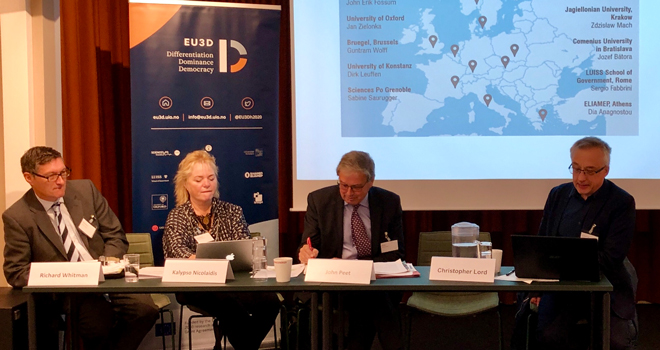.jpg)
On 19 September, a number of British, Norwegian and international researchers met in Oslo to discuss Brexit and the Norway model at a joint EU3D and Benchmark conference organised by ARENA.
The unknowns of Brexit
As we approach what was supposed to be Brexit day on 31 October, the outcome of the negotiations is still unknown. Whether the UK ends up with a hard Brexit, an agreement with the EU, there is confusion about what those options actually mean for the UK’s future relationship with the EU.
There is a lack of understanding of the UK’s past and present relations to the EU, and of what Brexit really means, among UK citizens and policy makers.
‘Regardless of what will happen on “Brexit day”, the future relationship between the UK and the EU remains unclear’, said John Erik Fossum, ARENA professor and Scientific Coordinator of the EU H2020-funded EU3D project.
On the eve of the conference, former UK Ambassador to the EU Sir Ivan Rogers had provided his take on Brexit and the future of Europe. ‘We are far nearer the beginning of this process than the end’, he reminded the audience.
Video: Sir Ivan Rogers on Brexit and the future of Europe
ARENA professor Chris Lord, who coordinates the BENCHMARK project, underlined that there is not only uncertainty about Brexit, but also a lack of understanding of the UK’s past and present relations to the EU, and of what Brexit really means, among UK citizens and policy makers.
‘If the UK had been honest about how much the government actually participates in EU decision-making, it would have been harder for Brexiteers to invent the myth of ‘regaining control’, Lord argued.
Norway is not really a model
The ‘Norway model’ is often brought up as an alternative for how the UK might structure its relations with the EU after Brexit. According to John Peet, political editor of the Economist, the ‘Norway model’ was viewed with interest early on in the Brexit debate. Since then, however, the debate has become far more polarized, and with that, the support for compromise solutions has declined.

Meanwhile, there was agreement among conference participants that calling Norway’s relationship with the EU a ‘model’ is a big overstatement.
According to Ulf Sverdrup (Norwegian Institute for International Affairs) and Lise Rye (Norwegian University of Science and Technology), the ‘Norway model’ must be understood as a political compromise. It reflects the need to reconcile EU access with the fact that people voted against EU membership in 1972 and 1994. Since the last referendum, Norway’s affiliation has expanded greatly in depth and breadth.
‘Norway’s relationship to the EU cannot be exported’, argued Sverdrup, pointing to the fact that the so-called model is dynamic and has evolved over time. The very prerequisite of the model was very different for Norway in 1994 than it is for the UK today.
Differentiated disintegration and the European political order
Brexit is a question of further differentiation, John Erik Fossum argued, explaining that the European Union has become more differentiated in the last decade. Differentiation implies that there is considerable variation in the way that member states participate in EU policies and programmes. For example, only 19 of the EU’s 28 member states have adopted the Euro, and Norway, Iceland and Liechtenstein are parts of the internal market and Schengen without being members of the EU.
The European political system post-Brexit will change, but exactly how depends on how the process of Brexit unfolds.
The phenomenon has often been referred to as differentiated integration, allowing some states to integrate at a slower or faster speed than the rest. Meanwhile, Brexit raises the question of differentiated disintegration, said Fossum: ‘With Brexit, the UK will occupy a new status in Europe, that of ex-member-state’.
According to Fossum, Brexit will have profound effects on the European political order:
‘The European political system post-Brexit will change, but exactly how depends on how the process of Brexit unfolds’.
A disorderly Brexit
The EU is concerned with managing Brexit in an orderly way. In other words, the EU has tried to follow established procedures and to speak with one voice. The UK government, on the other hand, has vowed to leave the EU with or without a deal.
If there is no deal, the stage will be set for power politics, according to Fossum. ‘There will be a lack of predictability and possible breakdown of trust’.
Fossum explained that this is problematic because lack of order means that arbitrariness will arise, and there might be a breakdown of coordination and cooperation in the EU.
Read more: Visit the event website for more information about programme and speakers
EU Differentiation, Dominance and Democracy - EU3D is a ARENA-coordinated project funded by the European Union's Horizon 2020-programme (2019-2023).
Benchmarking Brexit: Norway and the Legitimacy of UK-EU relations after Brexit - BENCHMARK is a ARENA-coordinated project funded by the Research Council of Norway’s research initiative ‘Europe in Transition’ (EUROPA) (2018-2021)